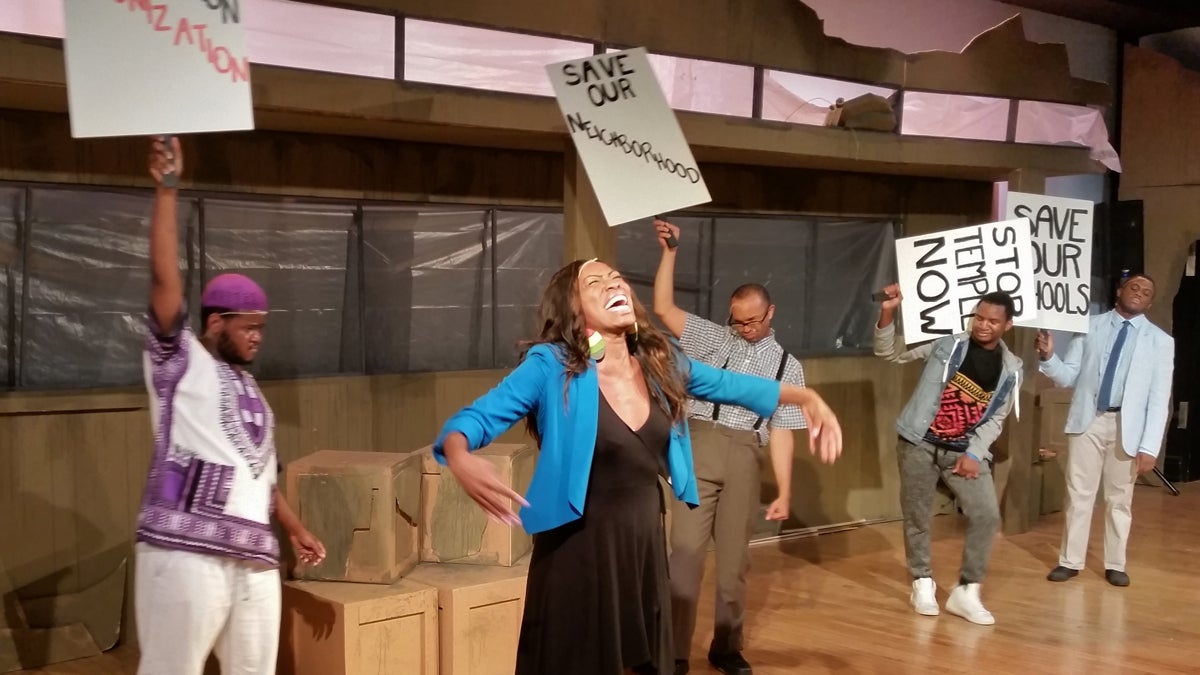Revival of ‘Can’t Cope’ recast telling story of lost North Philly school

New Freedom Theatre's production of "Don't Bother Me
This week, the New Freedom Theatre in Philadelphia will stage a new production of the 1972 Broadway musical “Don’t Bother Me, I Can’t Cope,” set in the ruins of a high school that used to be across the street from the theater.
The black box stage is set as a demolition site of the former William Penn High School on North Broad Street, which had been shut down by the school district, then sold to Temple University, and was now razed to make way for a new athletic facility.
The old play has new relevance regarding neighborhood gentrification.
“At one point the rubble and noise was so overwhelming,” said the company’s producing director Sandra Houghton, who had a front-row view of the demolition right outside her office window. “You can feel the visceral anger of people walking across the street. They would stop in front of our building and shake their head.”
“It’s not anger, it’s more frustration,” said Rajendra Maharaj, the director of “Don’t Bother Me.” “Anger means I’ve loved you enough that you can hurt me. Frustration means you don’t see me.”
Many residents of North Philadelphia went to that high school, and later sent their own kids there. Haughton said they were surprised to see it torn down and angry because they had no say in the matter.
“Don’t Bother Me, I Can’t Cope” was the first Broadway production directed by an African-American woman — Vinette Carrol — who was nominated for a Tony award. The musical revue was written to reflect issues effecting black urban communities in the early 1970s: street violence, discrimination, poverty, and gentrification.
“It feels like it was written today,” said Maharaj, who arrived at Freedom four months ago to be guest artistic director. “The struggles haven’t changed, but it’s a bigger question of how here in North Philly we can co-exist with Temple. You can feel two trains running. They have to come together. The community is not going anywhere, the Temple is part of the community.”
Since arriving last spring, Maharaj has taken to regularly jogging around the North Broad neighborhood, often stopping to talk with neighbors. “I’m from the West Indies, and we talk to each other. Funny concept,” said Maharaj. “You get to meet the most interesting people in North Philly, in the evenings on Broad Street.”
Residents of North Philadelphia have had an ongoing, contentious relationship with Temple University as the school has begun to expand aggressively. Academic facilities and student housing have changed the neighborhood, some say not for the better.
“People have strong feelings about relationship with Temple,” observed Maharaj. He saw how theater can play a role in the real-life urban story.
The production opens with a sound collage of sound bites from recorded interviews with people living around Temple, explaining their reservations and worries about the evolution of the neighborhood. On stage, the musical numbers are interspersed with the cast of singers carrying signs and chanting anti-Temple slogans.
But after a passionate, moving performance of “So Little Time,” the tone of the production shifts toward reconciliation.
“This is not a come-bash-Temple show. Really, it’s about how do we co-exist?” said Maharaj. “We have to find a way to build bridges. It’s frustrating for people when they feel their voice is not being heard.”
Just as the production begins, the theater is itself the source of neighbor frustration. After years of struggling to stay solvent, the New Freedom Theatre has begun a re-structuring process, which required it to fire longtime staff and cancel its summer education program. The move upset some former students and parents of students.
WHYY is your source for fact-based, in-depth journalism and information. As a nonprofit organization, we rely on financial support from readers like you. Please give today.





